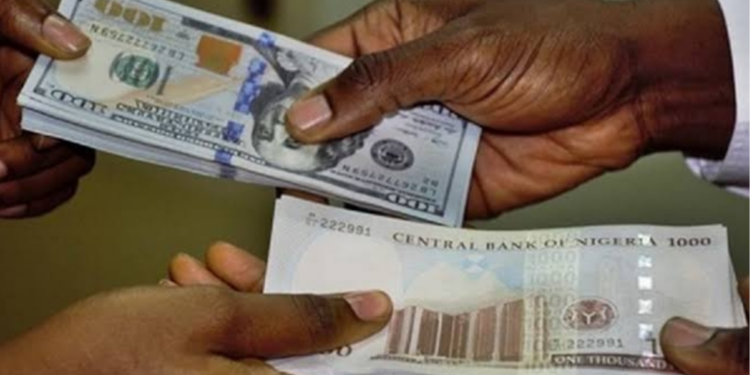The naira fell against the U.S. dollar at both the official and parallel market on Tuesday after the local currency recorded a gain against the dollar in the official market the previous day.
The domestic currency depreciated 9.73% to close at N830.97 to a dollar at the close of business on Tuesday, data from the NAFEM where forex is officially traded, showed.
This represents an N80.83 loss or a 9.73% decline in the local currency compared to the N750.14 it closed on Monday.
The intraday high recorded was N1121/$1, while the intraday low was N600/$1, representing a wide spread of N521/$1.
According to data obtained from the official NAFEM window, forex turnover at the close of the trading was $122.46 million, representing a 30.72% decrease compared to the previous day.
Similarly, the naira at the parallel forex market where forex is sold unofficially, the exchange rate depreciated by 0.44%, quoted at N1140/$1, while peer-to-peer traders quoted around N1146.08/$1.
To address these challenges and stabilize the exchange rate, the Central Bank of Nigeria (CBN) has implemented various measures, including raising interest rates and restricting access to foreign exchange. However, the effectiveness of these measures remains to be seen.
What the financial experts are saying
To address the challenges of the forex crisis in the country, financial experts interviewed by Nairametrics exclusively noted that a multi-pronged approach is necessary, encompassing measures to boost domestic production, enhance market confidence, and implement sound fiscal and monetary policies.
They noted that a crucial step towards alleviating the forex demand is to enhance domestic production, particularly in the petroleum sector. This involves enabling private and public refineries to operate at full capacity, reducing reliance on imported petroleum products.
Additionally, fostering domestic manufacturing and agriculture will further reduce the need for foreign exchange to acquire essential goods.
The Executive Vice Chairman, of Hicap Securities Limited, Mr David Adonri also in an exclusive chat with Nairametrics said the government should enable private and public refineries to work
He noted that the major cause of the imbalance is pressure from the excessive importation and the major part of the importation is petroleum products imports.
- “Hopefully when Dangote and public refineries start producing, then the massive importation of petroleum products will ease the pressure of the forex exchange market,” he said.
Adonri called on the government to enhance the security network to facilitate domestic production to reduce import dependence and pressure on the naira.
- “Because the cost of depreciation of naira is the scarcity of hard currencies, then in the medium to long term, the restoration of securities and increase in domestic production will also ease the pressure on the foreign exchange market. This will enable the naira to regain ground,” he said.
According to him, the government should also roll out other appropriate fiscal measures to close the supply gap in the economy.
- “They should understand that further use of monetary policy measures cannot rein in inflation because they have reached their limits as demand management strategies.
- Now that the monetary policies which are demand management strategy can no longer rein in inflation, then the only option left is the deployment of fiscal policies and actions,” he said.
Speaking on the effect of currency speculators, Adonri said there are speculators in every deregulated economy and that the speculation is caused by scarcity.
- “Once that scarcity is eliminated, speculation will suffer heavy losses that will serve as a market-based deterrent and disincentive for further speculation. That is an attribute of the market based on supply and demand.
- The government should not use administrative methods to discipline speculators in the market, they should allow the normal market design to take its cause rather than imposing discipline on speculators,” he said.





















